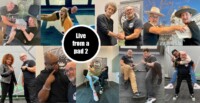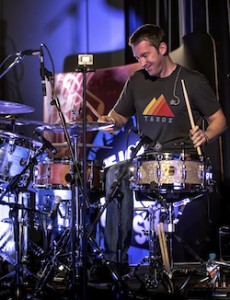 Mike Johnston is probably one of the most recognisable names on the drum circuit today. The drum community surrounding his online lessons, consisting of drummers from all ages and levels of ability, extends over the whole globe and is growing bigger every day.
Mike Johnston is probably one of the most recognisable names on the drum circuit today. The drum community surrounding his online lessons, consisting of drummers from all ages and levels of ability, extends over the whole globe and is growing bigger every day.
But even if you’re not a regular subscriber, every drummer has seen at least a handful of Mike’s video lessons. His website ‘mikeslessons.com’ has not only made him one of the top educators of our time but also revolutionised drum education forever – and he has big plans to increase his lead even further.
I caught up with Mike at his Masterclass in London to talk about his early days of drumming, his website and many other things.
Let’s talk about the time before your website. When did you start playing drums?
I started when I was five. I started in my school music programme playing clarinet. For some weird reason when I was five I thought the clarinet was the coolest instrument on the planet. I kept passing out while we worked on our whole notes because of all the blowing, so my teacher moved me to drums – and that was it. I started playing bass drum in the school band and my parents were really supportive and got me a drum kit. That wasn’t a choice, I was really upset. I was like: “Oh, I gotta go back and play drums, I just wanna play clarinet, it’s so cool!”. I don’t know why…[laughs].
One of your teachers was Steve Ferrone?
Yes, for a very short time, he definitely wasn’t one of my private teachers. I was getting ready to record my first major label album and the producer felt that I needed some help with my groove and feel. He knew Steve and hired him to do some private lessons with me. I rented out a rehearsal room and set up two kits for us. He came in, listened to what I was doing on the album, took all the silliness out of it and said: “Just do this.” It straightened up the whole album, it really helped!
Was that with ‘Simon Says’? That was your first dive into the professional side of things, right?
Yes, it was my first serious thing. We got a major label record deal when I was 21. That was with Hollywood Records which was owned by Disney, so there were all the financial resources in the world. The record industry was very different, there were big record deals back then. The album that Steve helped on was our second album. It was funny, I remember playing him the demos I played on and he went: “Are you listening to the guitar player at all?” I went: “Nope.” – “How about the bass player?” – “He’s getting in my way too.” He made a point saying: “You should listen to your band and craft your drum parts around that.” In my head I was trying to impress drummers with this, but he was thinking I should try to sell a few albums. I was so young and so naive, it was a great lesson.
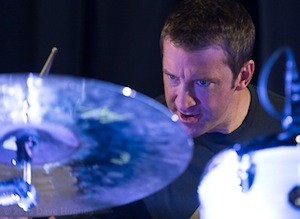 That was full on metal, wasn’t it?
That was full on metal, wasn’t it?
I think it was called Nu Metal, I call it ‘Rage Against The Korntones’. It was just rap, scream, rap, scream… but yeah, it was definitely very heavy music drum wise for sure.
The idea for the website came while you were on tour recording lessons for your students back home, right?
Yeah. Back then YouTube was brand new and I looked at it as a server that would just hold my videos for me but I didn’t think anybody would actually see it. So if I went away on tour I could tell my students ‘Listen, I’m not here for your lesson but I made a video for you, it’s on this thing called YouTube.com’. At that time most people didn’t even have the bandwidth to stream the videos. They had to buffer all night long to watch three seconds [laughs].
When I came back from tour the videos should have had two views from the students I made them for, but they had 60,000 views. It felt so weird that random people would watch a drum lesson, but when it reached 1 million views I thought there definitely is a need for this.
I then took inspiration from iTunes which just came out at that time. I thought we’re spending so much money on drum DVDs but sometimes I only need one thing from the DVD – why can’t I just buy the chapter that I need?! So I made an iTunes for drummers.
How do you even go about starting something like this? Sounds like a huge project.
Yes absolutely. One thing that people really underestimate is that you need a following that’s demanding the content you offer. I’ve seen people trying to start out similar businesses – which they should because they are great drummers and explainers – but there is no following to purchase the content. So the first thing I did was four years of YouTube lessons building trust, building followers with a goal of getting to 100,000 subscribers buying into a message of positivity and clear explanations – and then you’re hoping that maybe 10% of them are willing to follow you to a paid website that will offer something more than the “tips & tricks” style of lessons that I was making for YouTube.
The next step was who’s gonna make the website, how do you deliver content like that? There were no templates for that. I found a website with video lessons on every program in the world, so I learned how to code, html, java script, action script and so on. In our house we had what we called the ‘two shake rule’ which means that when me and my wife go to sleep, if I could shake her twice without waking her up, I was allowed to leave the bed and start learning. I spent 10pm to 2am every night learning how to code, graphic design, video editing, audio editing, video production, cameras, lenses, f-stop – I learned all of it. Simply because I couldn’t afford to pay anybody for it. I have a developer now but other than that mikeslessons.com is just myself, it’s always been that way. Even if you see camera movement it’s either my wife moving it or I have an automated slider by my floor tom where the camera just goes back and forth.
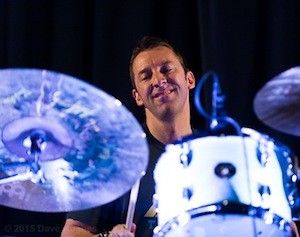 The website has been going for a while now and I imagine the workload just builds up more and more. Apart from the help of your wife you’re still doing it on your own?
The website has been going for a while now and I imagine the workload just builds up more and more. Apart from the help of your wife you’re still doing it on your own?
Yes. About three years into the business my wife took over the administrative side. Especially because the emails built up so much. These weren’t junk emails, they really needed replies. She’s very drum savvy now, so if you ask “Hey Mike, what size is your side snare?”, she immediately knows what I’m using. She knows it all by now. Then she’ll save three or four emails a day that really need my personal attention and I’ll take care of them. It works great.
Do you draw the inspiration for your teaching from your old drum teachers or is it rather stuff that you wish your former tutors would have done?
It’s both. I had some early teachers who didn’t believe in me, so I got used to that sense of people doubting me and I never wanted to pass that on to any other students. So they taught me what not to do. I had teachers that didn’t expose me to the greats. They just taught me out of books but they never taught me for me. Because of that the first thing I ask somebody in their first lesson with me is: Who’s your favourite drummer, who’s your favourite band? What do you wish you could do with the drums? If I was a drum genie and could grant you three wishes, what would they be? Tell me all that personal information and I will craft a whole new lesson plan just for you, so you never have to wonder if I just teach you the same things as the kid before you. No, it’s just for you. So even if we work on something boring you know that I know your dreams and even the boring stuff is getting you closer and closer to your goals. That’s something I learned from the teachers I didn’t click with.
Then I had a fantastic long term teacher named Pete Magadini, he’s a world class educator. Everything I took as a positive was from him. After that I just had great role models like Roy Burns from Aquarian. He was the first guy who put his hand on my shoulder and said: “Look, when you play drums you’re good, but when you teach you light up. You should consider becoming an educator.” I just went: “Really? I don’t have to do this record label touring thing anymore?”. It was like he gave me permission to do what I had always known I wanted to do.
Talking about that: do you ever feel like it’s pulling you back out on the road to tour with a band?
No, never. The great thing now is that the part the does pull me back out, the personal interaction with the fans, the thrill of performing, I get it now as a touring clinician. I still get to travel, I get to meet new people but I don’t have to deal with the nightmare of being in a band. A band is like a four-way marriage. When it’s good it’s the honeymoon, but when it’s bad, it’s bad! Also, I’m an only child so being alone is something that I love. Sometimes I dream that my plane will crash on a deserted island and I’ll just be there by myself and as long as I’ve got one animal I can teach things to, I’m happy.
Especially now that my name built itself up in the drum industry we get quite a few tour offers. Amber (my wife) will tell me that this and this artist wants me in their band but I never even consider it. It’s always a no but I immediately start thinking which one of my friends would be perfectly suited for that and I pass it on to them.
 You have students from all over the world. What difficulties does this impose on you, keeping in mind some of them might struggle with English?
You have students from all over the world. What difficulties does this impose on you, keeping in mind some of them might struggle with English?
It’s actually a huge benefit. I teach every lesson as if everyone watching struggles with English. That way if I can get them to understand it, everyone will understand it. My ideal student in my head is an 8-year old in China. If I can make an 8-year old in China understand my lesson, everyone else in the world can. That’s who I see when I’m looking into the camera lens.
Online lessons vs. drum teacher in the room. It’s a big topic…
Yes absolutely. Perfect question.
The one thing that I need to do a better job of getting across, is letting people know that the reason we originally set the price so low at $20 a month was so you could afford ‘in-person’ lessons as well.
Since we were the first company doing this, we ended up setting the price for the industry. Now all online drum lessons are $20 a month. I was actually doing my first interview ever with a South African drum magazine eight years ago and told him pretty much everything about my idea for online drum lessons. He asked me how much I was thinking about charging and I said $100/month. He immediately went: No one can afford that in South Africa. I asked $50/month? He went: nope. Finally, I asked him what he could afford and he gave me the figure of $20/month. That literally became the price and it never changed.
As the time went on I thought: well, at $20 a month you can afford my lesson AND a private teacher. The goal would be that you work on my stuff and then you take it to your private teacher. Hopefully if he’s secure with himself – or she is secure with herself – they’re not threatened by my lessons, they’re gonna take it on.
So yes, I’m really in favour of private lessons. Hell, I am a private teacher, that’s how I started.
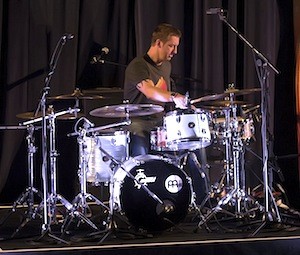 I read about your ‘positive post campaign’. I really like that. What was the feedback you get for that?
I read about your ‘positive post campaign’. I really like that. What was the feedback you get for that?
It was incredible – and it still is because I still talk about it at clinics and it always gets the biggest round of applause, so it clearly is important to people.
What triggered the whole thing was one of my older students who had waited his whole life to play drums. As a kid he couldn’t afford it; as a teenager his parents didn’t allow it – and as he became a successful adult he decided to get a drum set. He took a couple of lessons with me and his whole dream was just to play an ACDC song. He eventually learned it, filmed it, uploaded it to YouTube, and then everyone rips him to pieces and he quits. That’s it. The entire industry just went down by one person because of hate. Dude, he was playing a song, what is there to hate about that? Why would you have to rip that up?
Also, I had some great human beings in my life who taught me how to be a better person. One of the biggest misconceptions in the world is that I am a positive guy. I can be one of the biggest jerks on the planet. The only difference is, just like drum techniques, I’ve learned techniques to squash that negativity that’s natural inside of me, put it on pause for once second and talk myself out of it. When I see a drummer that is not very good, I have the same reaction as everyone else does. I’m immediately making fun of him in my head but I have a technique where I squash that down and ask myself a few simple questions: How long has he been playing? Did he have the support of his parents? Did he have private lessons? And so on… That now takes less than two seconds. Immediately I’m able to say: Wow, that’s really cool, I’ll talk to him afterwards. Maybe he’s been playing for a week and what I just saw was actually brilliant. But I was comparing him to myself who’s had private lessons for 30 years. I just felt like this process should happen online as well.
The problem is that people compare guys like Lars Ulrich and Travis Barker to the drum gods we have. That’s completely unfair because you’re comparing apples and oranges. My thought is: How many people started playing drums because of Virgil Donati? Or me? No one ever found me on YouTube and went to pick up some sticks for the first time. You start because of Travis Barker or Lars Ulrich or whoever is playing in your favourite band. They are ambassadors who brought tons of new people into our industry.
The flip side is: let’s put our greatest jazz drummer on stage with Metallica and see how he does. He’ll be gassed and out of breath within the first song. Just let them live in their own areas. I don’t compare Steve Jordan to Virgil Donati; I don’t compare Thomas Lang’s groove to Steve Gadd. I leave them all in their own category and appreciate them for what they are – and they are all brilliant. The band guys, the Tommy Lees and the Ringo Starrs of the world, they are the ones who got people to start playing in the first place. We should thank our lucky stars that they exist, otherwise our industry would suffer immeasurably.
I love the story how the name of your signature stick came about.
Ha. Yes, there is a little more backstory than most people know.
At the mikeslessons facility that we’ve built for drum camps (that’s where we film everything as well) we have a bathroom which is attached to our building, so it has a code to get in. When we first started doing drum camps all day long people would ask me for the code. All day long! “What’s the code, what’s the code?!” I remember saying: “If I ever get a signature drumstick I swear to God I’ll put that code on the stick cause I’m so sick of this!” [laughs]. I wasn’t trying to get my signature stick, but when I made my move to Vater I was trying to find something and we just ended up developing one. Way later people were requesting the stick I was playing and Vater said we need to make this a signature model. I said: “Ok, call it the 2451.” I told Chad at Vater what it was and he thought it was great, but it turned out he didn’t tell Alan Vater, the president.
Later on the stick became the number one selling stick in their whole catalogue and Alan called me and went: “Mike, it’s Alan Vater. Did you put the code for your pisser on my drum stick?”. I go: “Err, yes sir..” – thinking he’s gonna kick me off the roster. He just went: “Fucking brilliant!” and ended the call. That’s when I knew I’m with the right stick company.
 I think that stick was a bit of a wake up call for companies. Signature models don’t sell at all. You’d be shocked at the number of Travis Barker sticks compared to 7A’s for example, it’s shocking. To have a signature product become the number one selling stick in the entire line up – the whole industry didn’t know what to do with it. He’s not in a band, he’s never done anything cool with his life, there is nothing to attach him too (he’s not the drummer of Muse or anything), there was none of that.
I think that stick was a bit of a wake up call for companies. Signature models don’t sell at all. You’d be shocked at the number of Travis Barker sticks compared to 7A’s for example, it’s shocking. To have a signature product become the number one selling stick in the entire line up – the whole industry didn’t know what to do with it. He’s not in a band, he’s never done anything cool with his life, there is nothing to attach him too (he’s not the drummer of Muse or anything), there was none of that.
There were two things that happened there:
One: I leveraged social media to make a campaign out of this – instead of doing what the industry has always done which is take a full page out of a magazine. My thought was we’re going to build video after video leading up to this and make a campaign out of it – with no money, I’ll do it all by myself.
The second thing was that I’m just the ‘every man drummer’. If I need something, most likely a lot of people in the world need it too. I’m not 6’9 with crazy hands, I’m a really normal dude. Everyone asked why there isn’t something between a 5A and a 5B, so we made it – and it turned out everyone needed it.
The other very important business lesson: we never ever called it the ‘Mike Johnston stick’. Drummers are artists, they don’t want to play your stick. Same thing with my ride cymbal: it’s called the ‘Transition Ride’. It’s not the ‘Mike Johnston signature ride’. You never have to say: “I’m playing the Mike Johnston ride”. It doesn’t feel like you’re trying to sound like somebody or you’re below them. You’re your own artist.
Tell me more about your app?
The good thing is that since it’s a subscription model iTunes requires us to update it with new content every month. That’s something that I can’t do in a book. I’m not going to re-publish a book every month. I think by now the app has about 25 pages that aren’t in the book. Every month I’m writing new content for that book and it goes to the app. That’s a really cool thing.
Right now we’re in the middle of developing it for two new platforms. For the new giant iPad and we’re also developing it for iPhone. We had to completely redesign it from scratch for the iPhone because it’s too much information to fit on the small screen.
I wanted to show the educational industry that this is where books should be. It’s not an app just to be an app, it’s a digitalised version of my book that takes advantage of the technology of apps. Everything that’s in that app is what I had to do in my head for books previously. I had to separate the hi hat, separate the snare because I couldn’t hear them together. To now have four limbs just go “whoop” and shoot out, that’s what it’s all about.
The second app we have is ‘Groove Scribe’ which is available for free on the website. I’m really proud of that. It’s really connecting the dots for everybody, it’s a ground breaking thing.
So do you think the apps and online stuff is gonna take over from the books and DVDs?
Yes absolutely. I think Benny Greb’s DVD will probably be the last drum DVD really ever made. I remember even when it came out he asked me if I wanted the DVD or the digital version. I was thinking: the old school version of me wants the DVD but then I realised I have nowhere to play this. What am I gonna do, rub it on the TV? I don’t have a DVD player. So yeah, I think where we’re headed right now is obviously all digital.
What’s next?
I’m taking all of 2016 off from clinics and festivals, I’m doing no travelling, to just focus on mikeslessons.com. We’ve spent about 16 months now to work on the newest version of it and it’s completely changing everything we’ve done for the last six years. There are quite a few drum lesson websites out there now and I want to leave them in their own category and I want to move into higher education for drummers.
We’ve been developing an extremely new personal system so that for every ounce of money you spend on my website, we hold you accountable for. No more spending money and just not practising. We track everything you do and we bother you to check if you’ve practised.
When we started doing the new version I told my developer that every single ounce of code you write has to be related to one of three things: accountability, inspiration or organisation. We help the drummers to organise their practise time; when they get down I will inspire them; and any time they spend money, we will hold them accountable for it. If we can do those three things we can change online education forever. That’s what’s next and I can’t do that from hotel rooms, so that’s why I need to take some time off.
We’ve developed it, it’s in its beta test version right now and we’ll launch it in January.
Then I’ll spend a year at home – still doing my drum camps – but no travelling. I had to tell Meinl, Gretsch, everybody: no matter what we get offered, turn it down for one year because I want to change the world of education and I know I can.
My goal is to create a website that if you took all of the drum lessons out of it and replace them with physics or English lessons, it would work fine. I want to create the best educational website that ever existed. I don’t even sleep anymore, I sit up at night and see all these images flashing through my head and I’m so excited. My dream is that a year from now I run into some kid that lives in a small village that doesn’t have access to drum lessons and he’s a freakin’ bad ass because of our website. That would be my dream.
Interview by Tobias Miorin
January 2016
Photos by Francesco Desmaele and Dave ‘The Drummer’ Hughes

